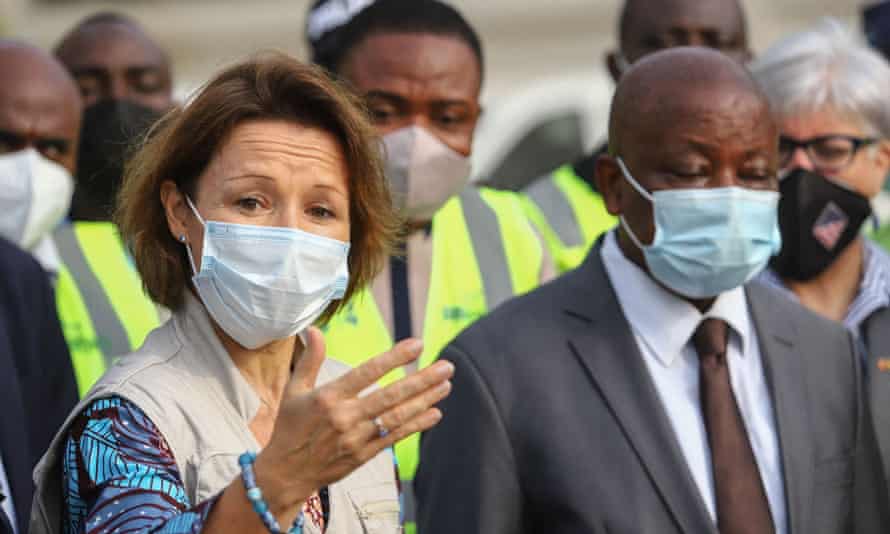
Covax has delivered its first Covid-19 doses in a milestone for the ambitious programme that seeks to offset “vaccine nationalism” by wealthy countries and ensure poor ones do not wait years to start inoculating people.
An aircraft carrying 600,000 doses of the Oxford-AstraZeneca vaccine landed in Accra, the capital of Ghana, on Wednesday, where jabs will be administered to frontline health workers on Tuesday. Vaccine doses will arrive on Friday in Abidjan, Côte d’Ivoire, and will be given from Monday.
Covax aims to distribute enough vaccines over the next six months to inoculate 3% of the population of 145 countries – enough to cover health workers and some of the most vulnerable – and aims to deliver tens of millions more by the end of the year.
“This is a momentous occasion, as the arrival of the Covid-19 vaccines into Ghana is critical in bringing the pandemic to an end,” Anne-Claire Dufay of Unicef Ghana, and the WHO country representative, Francis Kasolo, said in the statement.
Though the programme is low profile and complex in its administration – run by four separate organisations including the vaccine alliances Gavi and Cepi – Covax is quietly radical in its aims, trying to build a mechanism for the equitable distribution of vaccines in the teeth of the worst pandemic in more than a century.
Its 192 members include wealthy countries, whose advance purchases through Covax were used to subsidise vaccine research as well as to secure doses for poorer countries.
It is seen as the only viable alternative to the kind of vaccine free-for-all that prevailed during the swine flu pandemic in 2009 and in the years after Aids treatments were first created. In both cases, poorer countries went without effective pharmaceuticals during the acute phases of the pandemics and received supplies only after they had become plentiful in the wealthy countries.
But in practice, alongside signing up for Covax, wealthy countries have engaged in a frenzy of private deals with manufacturers of western-developed vaccines, locking up much of the global supply for 2021. Many countries, including the UK and Australia, have opted not to take vaccines from Covax, effectively using it as a way to channel their Covid-19 aid.
G7 countries last week raised their contribution to Covax to £5.3bn, but public health activists say the programme needs not just money but some of the excess vaccine doses that wealthier countries have procured. Only France and Norway have agreed to give doses up front, and other countries such as the UK have said they will give from their excess supply at an undetermined date.
“It was originally designed to consolidate the vaccine procurement process and ensure that doses went out to all countries at the same time … but it didn’t actually work that way for reasons that are entirely predictable,” said Andrea Taylor, an assistant director at the Duke Global Health Innovation Centre.

“It turns out the incentives for leaders of rich countries are not aligned with that design. Rich countries said they support global equity, here’s some money to buy vaccines for poorer countries, but we’ll go ahead and take care of our own supply because we want to be responsibility for quantities and the delivery schedule.”
Still, she said, the world was better off for the programme’s success so far. “This is an unprecedented challenge, it’s a groundbreaking solution … It’s not an easy thing to build the car as you’re driving,” she said.
Covax says it has enough supply in the pipeline to inoculate 20% of the population of its member countries by the end of the year, though analysis of public information by the Duke Global Health Innovation Centre suggests this may be ambitious, and the Serum Institute of India – the largest supplier of vaccines to Covax – has suggested it might take at least 18 months to fulfil its commitment.
So far, more than 190m Covid-19 vaccine shots have been administered, 75% of them in just 10 countries, according to the World Health Organization, which also helps to run Covax. About 130 countries are yet to start vaccination programmes.
Experts such as Gavin Yamey, who helped design Covax, on Wednesday called for rich countries to “tithe” 10% of their doses they receive to the scheme. “Perhaps for every nine doses they administer, they can donate one dose to Covax,” he wrote in Nature. “This falls far short of ‘equitable’, but falls within what is possible.”
The WHO has warned that the inequitable distribution of vaccines will extend the life of the acute phase of the pandemic, needlessly disrupt travel and economies for years and create space for dangerous new Covid-19 variants to emerge.
In its place, countries such as Russia, China, India and Israel are using their access to vaccines to curry influence in the world through strategic giveaways.


